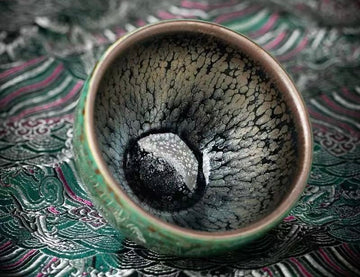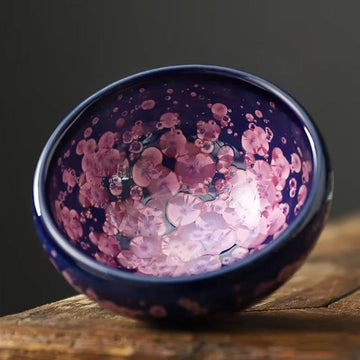“Exploring how ancient Chinese craftsmanship speaks to modern European minimalism”
In a world obsessed with precision, perfection, and symmetry, there is a quiet yet powerful philosophy that whispers a different kind of beauty — Wabi-Sabi. Born in ancient Japan, but rooted in East Asian aesthetics, this worldview embraces the natural, the impermanent, and the imperfect. And few objects embody it as purely and profoundly as a Jian Zhan teacup.
At Merélite, we believe that true beauty lies in uniqueness. Each Jian Zhan we present is a singular creation — shaped by fire, earth, and time — a reflection of nature’s unrepeatable artistry.

What is Wabi-Sabi?
Wabi-Sabi is more than a visual style. It is a way of seeing. It finds elegance in simplicity, and grace in the flawed. Cracks, irregular textures, color variations — these are not defects, but expressions of authenticity and life.
Though the term comes from Japan, the philosophy resonates with Chinese Zen aesthetics — which deeply influence the way Jian Zhan is created and appreciated.
Jian Zhan: The Aesthetics of Impermanence
Jian Zhan (建盏), first made during the Song Dynasty in China, was originally favored by monks and emperors for tea drinking. But beyond function, these vessels were prized for their unpredictable, mesmerizing glazes — created through a high-temperature firing process that no two pieces survive in the same way.
-
Natural crackles (开片) form spontaneously as the cup cools — delicate lines etched by time.
-
Oil-spot (油滴) or hare’s fur (兔毫) patterns shimmer subtly, like frost or feathers, impossible to replicate.
-
The glaze may vary from deep black to metallic blues, rust browns, or cosmic silvers — depending on how the fire moves in the kiln.
Each cup is a collaboration with nature, not a command over it. That is the essence of Wabi-Sabi.

Why Wabi-Sabi Resonates with the European Mind
Europe, too, has a long tradition of respecting craft, heritage, and timeless design. From the patina of aged leather to the charm of handmade ceramics in Provence or Tuscany, there is an understanding that imperfection carries soul.
In recent years, European minimalism and the slow living movement have embraced Wabi-Sabi ideals — rejecting sterile uniformity in favor of warmth, texture, and authenticity.
A Jian Zhan teacup on your table isn’t just a vessel. It’s a quiet protest against mass production. A celebration of the fleeting moment. A reminder to pause.
A Ritual of Reflection, Every Day
Whether you sip Chinese oolong, English breakfast, or Italian espresso, holding a Jian Zhan is like touching the past — and honoring the now.
At Merélite, we curate each piece with care, knowing it may become part of your personal ritual:
A moment of stillness.
A conversation with yourself.
A tactile encounter with beauty — imperfect, evolving, alive.

Conclusion: Beauty That Ages Gracefully
In the philosophy of Wabi-Sabi, nothing is ever truly finished. And nothing ever really perfect. The cup may crack, the glaze may shift — and that, precisely, is what makes it yours.
Jian Zhan is not for display. It’s for living with.
And like all things that truly matter, it becomes more beautiful the more it is used.
Ready to bring the quiet beauty of Wabi-Sabi into your everyday life?
Explore our curated collection of authentic Jian Zhan teacups, each one entirely unique.
Handcrafted. Timeless. Unrepeatable.




